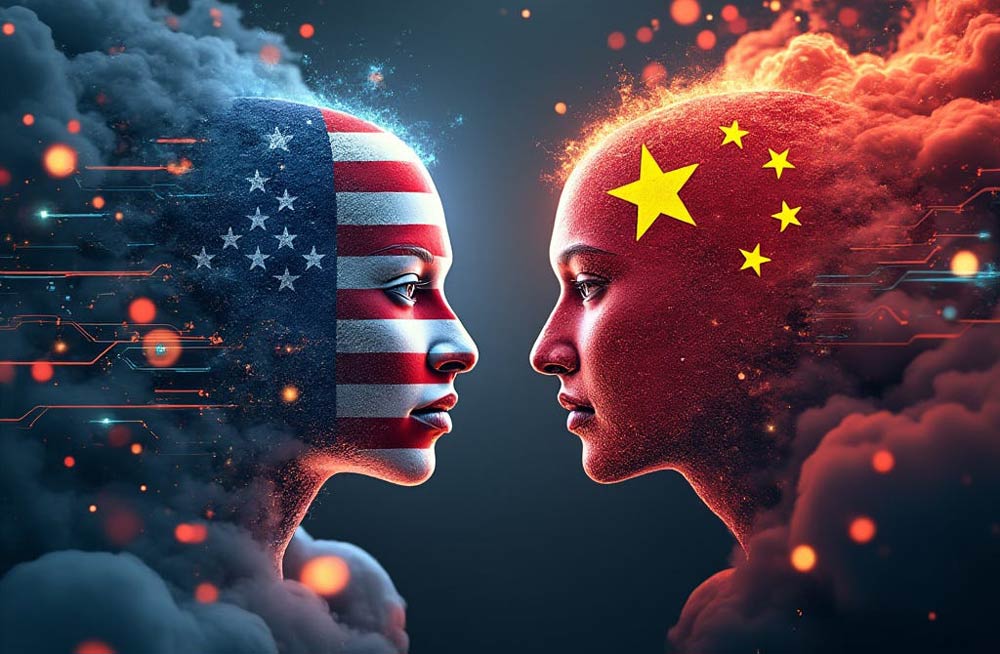The trade war between the United States and China has taken a significant turn, with Beijing shifting its focus from goods to services. Following a series of tariff hikes and retaliatory measures, China has escalated its response to U.S. economic policies by targeting the American services sector—a key area where the U.S. has long enjoyed a surplus.
This strategic pivot by China underscores its intention to broaden the scope of the trade conflict while signaling its dissatisfaction with what it deems “meaningless” tariff hikes imposed by the Trump administration. The latest developments reveal a calculated approach by Beijing to increase pressure on politically sensitive areas of the U.S. economy, including aviation, legal consultancy, education, and entertainment.
China’s Response: A Strategic Shift
While the U.S. has primarily focused on goods tariffs, Beijing has adopted a more diversified arsenal of non-tariff measures. These include export restrictions on rare-earth minerals, antitrust investigations into American corporations, and, most recently, a crackdown on U.S. services. The China-U.S. services trade surplus, which reached $32 billion in 2024, has now become a focal point in this economic standoff.
Wendy Cutler, Vice President at the Asia Society Policy Institute, notes that “Beijing is clearly signaling to Washington that two can play in this retaliation game and that it has many levers to pull, all creating different levels of pain for U.S. companies.”
Key Targets: Services and High-Visibility Sectors
China’s measures are aimed at services that resonate beyond dollar value, such as tourism, education, and entertainment. Here’s how Beijing has turned up the heat:
Travel and Education:
- China has warned its citizens against visiting or studying in the U.S., a move that could significantly impact the $24 billion annual tourism revenue generated by Chinese visitors. Education-related spending, which makes up 71% of travel expenditures, could also take a hit as over 270,000 Chinese students studying in the U.S. reevaluate their plans.
Legal and Consulting Firms:
- Beijing has hinted at curbing U.S. legal consultancy services, an area where American firms have long benefited from intellectual property-related work. Chinese state media has even suggested probes into U.S. firms operating in China, accusing them of reaping “monopoly benefits.”
Entertainment and Media:
- By reducing imports of U.S. films and media, China sends a symbolic message. Although entertainment exports make up just 6% of U.S. services to China, the reputational damage could ripple across Hollywood and the broader media sector.
Aviation:
- China has targeted Boeing, America’s largest exporter, by halting new aircraft deliveries and ordering airlines to stop purchasing parts from U.S. suppliers. This move compounds Boeing’s ongoing struggles with quality-control issues and threatens to erode one of its most critical markets.
Rare-Earth Minerals and Beyond
China’s export restrictions on rare-earth minerals have further tightened the screws on the U.S. economy. These minerals are essential for producing semiconductors, missile-defense systems, and solar cells. By requiring special export licenses, Beijing has effectively limited U.S. access to these critical resources, adding pressure on American tech and defense industries.
The Broader Implications of Decoupling
Experts believe these measures mark a shift from transactional economic tensions to a deeper, systemic decoupling of the two economies. The ramifications extend beyond trade and goods into areas like knowledge exchange, regulatory frameworks, and even people-to-people ties.
“These measures target high-visibility sectors—aviation, media, and education—that resonate politically in the U.S.,” said Jing Qian, Managing Director at the Center for China Analysis. “While they might be low on actual dollar impact, reputational effects—such as fewer Chinese students or more cautious Chinese employees—could ripple through academia and the tech talent ecosystem.”
Negotiation Prospects: A Stalemate?
Despite Beijing’s assertive stance, Chinese officials have left the door open for negotiations. However, they insist on talks conducted on an “equal footing.” In contrast, the U.S. has demanded that China make the first move, with White House Press Secretary Karoline Leavitt stating, “The ball is in China’s court: China needs to make a deal with us, but we don’t have to make a deal with them.”
This impasse raises questions about whether either side is willing to de-escalate. Jianwei Xu, an economist at Natixis, suggests that “only when a country experiences sufficient self-inflicted harm might it consider softening its stance and truly returning to the negotiation table.”









